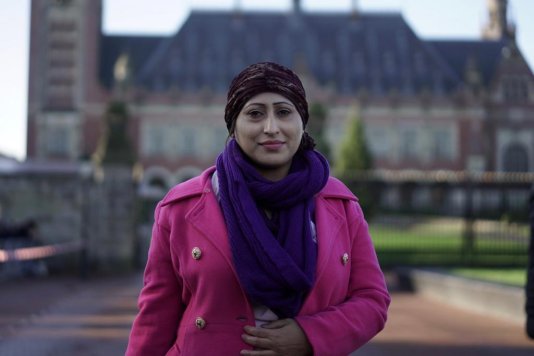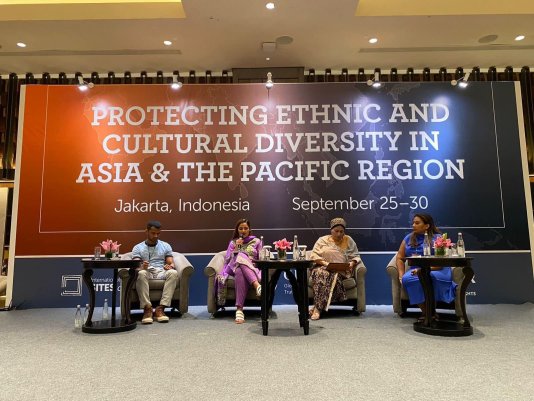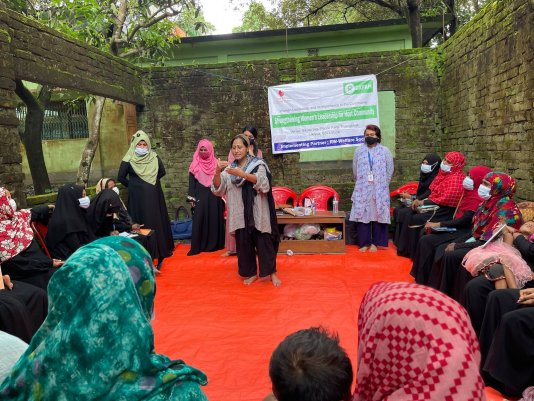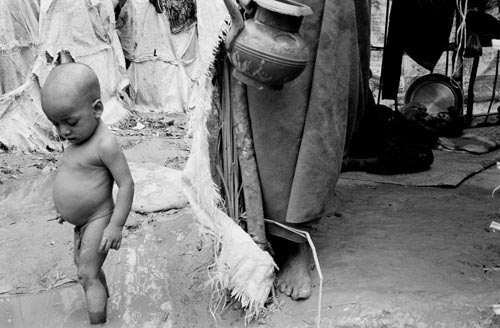- About
- Topics
- Picks
- Audio
- Story
- In-Depth
- Opinion
- News
- Donate
-
Signup for our newsletterOur Editors' Best Picks.Send
Read, Debate: Engage.
| October 19, 2022 | |
|---|---|
| topic: | Women's rights |
| tags: | #Rohingya, #Bangladesh, #women's rights, #sexual violence |
| located: | Myanmar, Bangladesh |
| by: | Magdalena Rojo |
Razia Sultana, 49, is a Rohingya lawyer, teacher and activist. Her parents migrated to Bangladesh from Myanmar (then Burma) in the 1960s.
When thousands of Rohingya refugees started fleeing genocide in Myanmar five years ago, Sultana's life changed. She became an advocate for Rohingya women living in refugee camps in Bangladesh and globally.
Her organisation, RW Welfare Society, is empowering thousands of female refugees in Bangladesh to know their rights and fight against gender-based violence.
FairPlanet spoke to Sultana about the state of Rohingya women these days, how she supports them and what she believe needs to change for their circumstances to improve.
FairPlanet: When Rohingya refugees started fleeing Myanmar and arriving in Bangladesh, you went to the field with the Kaladan Press Network as a translator. What were the stories women told you?
Razia Sultana: In those times, the fact that I was Rohingya myself really helped. When I told the women that I was born in Myanmar, it made them feel more secure. I purposely did not ask them about violence, I did not know things like that happened.
Some of them started sharing these stories with me. Slowly, they were gaining trust and would share their stories of rape [and] harassment.
Today especially elderly women are willing to share the incidents that happened to them, but it is because I am very open about my work and activities. It also helps build their trust towards me.
However, that sometimes leads to women having high expectations. Sometimes they think I can help them return to Myanmar - but it is not possible. I understand; their situation is very challenging.
What are the challenges that Rohingya women face in camps at the moment?
A lot of NGOs are gone. The food distribution has become a big challenge. Before, people were getting food twice per month, [but] due to the pandemic it has changed to one time only and not everybody gets it.
They do not have financial support and, at the same time, they are not allowed to do any livelihood activities inside the camp.
Last month the school shut down and education has since stopped.
How is the situation with regard to violence against women in the camps?
Violence has always been there; be it due to the narrow mind of people, religion or its misinterpretation. Slowly, especially domestic violence is decreasing. We are trying to prevent it.
I believe women themselves can change this situation. I have been running a psychosocial resilience programme in the camp since 2017. In the case of Rohingya refugees - women and men are both are traumatised. It is not only that they lost everything - they have been forcibly displaced and had to start over in a place where there are no proper conditions for them and their children.
Women cannot go out. It is not that men do not let them. It is because of the security, the fact that the camp is overcrowded and at night only the youth that live there guard certain areas. Women do face violence in these conditions.
How does the RW Welfare Society help this situation?
We have women groups that have been organising themselves since 2017. There are maybe ten self-help groups at the moment that the women themselves established.
At these groups' meetings, they spread awareness amongst themselves. My duty now is to connect them with each other and include them in our programmes so that they know each other and can share experiences.
They are already knowledgeable and are able to face many difficult situations. We just help them network.
We also have a women's group that communicates with diaspora leaders. They are connected with a women's network inside Myanmar. I just connect them, they are the ones to share their needs and issues, including on a governmental and advocacy level.
You mentioned the psychosocial programme. What does it entail?
It is a kind of therapy where women share their own feelings. They share about how they can grow their abilities and their confidence.
They also learn to ask for help and that everything is possible, even within their limitations.
How do men in the camp regard this programme?
The psychosocial resilience training is very new for Rohingya, and very few sectors in Bangladesh are doing this therapy. When I started, people might have had a wrong idea about it. So I made sure they understood what was going on.
When I started the programme, men were not allowing women to come to my centre; they said I stood against religion. I had to deal with it. I did sessions for men, I tried to understand why they acted the way they did. I assured them that if they are not respecting women, children do not have role models and they will never learn respect. You have to change your mentality so that your girls can be safe.
Since this community is deprived of education, when I give awareness talks, they are willing to learn.
I used the Korean model, but I had to change some things so that it fits my community, which also helped with the trust from the community. For example, there are singing exercises in the programme, but our centre Shanti Khana is near the mosque and school, we did not sing at the beginning.
Since the camp is overcrowded, clapping or laughing loudly was also not received well. Now nobody asks anymore if they do. The community now understands.
Also, at the beginning, it was my staff doing awareness campaigns. Now women involved in the programmes are strong evidence that things can be changed and they spread the information in their community.
How do you react when people accuse you of violating religious principles?
It is mostly happening online, on social media, where people spread this kind of information. But I am very positive. I share this with the youth group in the camp and they started standing against these posts.
They ask questions: What is it that she is doing against religion?
There are about 120 leaders trained by your organisation. I read that they are now able to denounce cases of violence. What does it look like in reality?
Our leaders are very confident, and if they see any domestic violence or abuse or if they get information about such cases they directly communicate it with the authority.
These women take action, and that is what we need. If anything happens, they are the first ones to respond. If a husband caused the violence, they talk to him; if it is caused by anybody in the community, they reach out to the authority.
And how do the authorities typically respond?
Since the organisation is already well established, they take action if it is necessary. They already understand that without action - there are no solutions.
These leaders you trained can reach up to 6,000 women. What would make your work even more effective?
I have been able to change the mentality of people in Camp 40 in Bangladesh. But there are a lot of other camps where the work could be done. I recently talked about this in Indonesia, too. We need cenrtres like the one I established in other camps to prevent violence against women.
A lot of people also leave for Indonesia or other places since there are no opportunities for them here in Bangladesh. In five years nothing has changed. Often it is this situation and the environment they live in that force them to be violent.
For example, human trafficking is a consequence of limited options and opportunities inside the camps.
You have given speeches at high-level events, including at the UN Security Council’s open debate on preventing sexual violence in conflict. Your work has been recognised in several countries. But what is your position in Bangladesh at the moment?
In high-level meetings, when they talk about Rohingya, they exclude the community that lives inside the camp and that also keeps them frustrated.
In five years, I have not gotten a single invitation to any meeting related to Rohingya inside Bangladesh. Even though I am a legal citizen, I have not had the opportunity to talk about the Rohingya situation.
How can you solve the problem if you do not include the community members?
I know that the authorities are observing my activities since they suspect I do something against the local government. But I have never had any intention like that. The Bangladeshi government provided shelter to these people, and I just want to spread awareness.
What keeps you going in the face of all these challenges?
Women's trust, their bravery and their hope.
Image by Halima Akter.



By copying the embed code below, you agree to adhere to our republishing guidelines.

